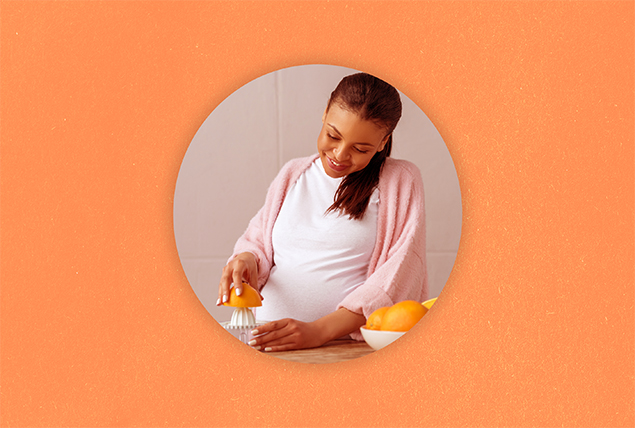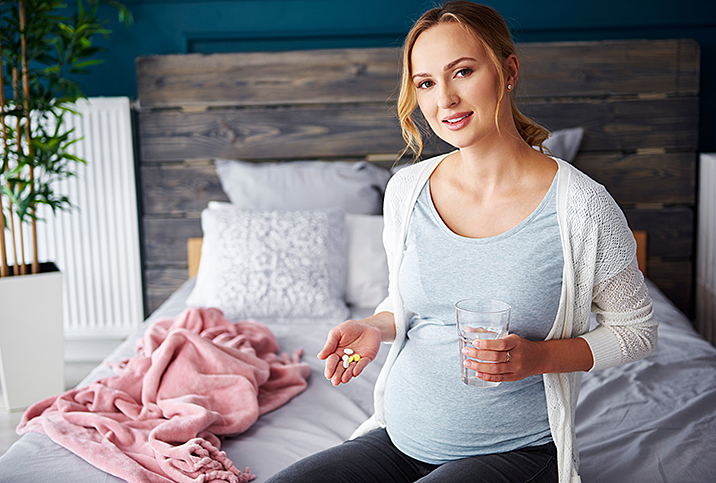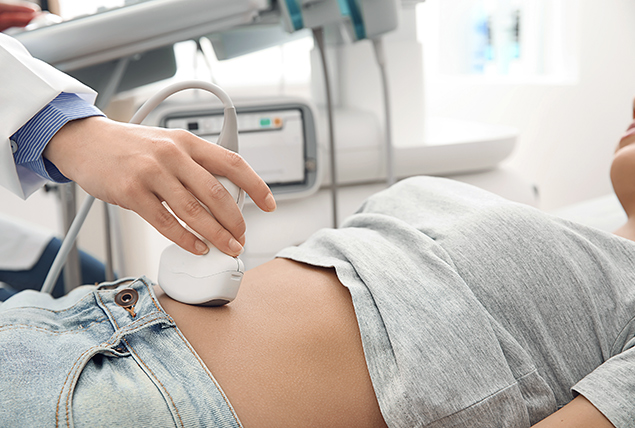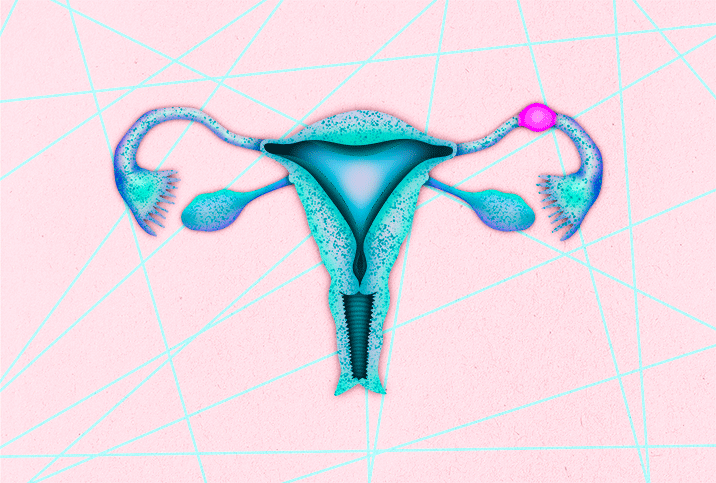Vitamin D Deficiency and Pregnancy: Are the Two Linked?

Key Points
- Vitamin D is important for a developing fetus.
- Mothers who lacked vitamin D had an increased risk of ectopic pregnancy, according to studies.
- Food, sun or supplements can help provide a mother with the recommended dose of vitamin D.
One of the most important facts about pregnancy is also the most obvious: nutrition matters. Doctors recommend most pregnant people take prenatal vitamins, but yours may suggest taking additional prenatal supplements, such as vitamin D.
Studies show that there's a link between a vitamin D deficiency and the risk of an ectopic pregnancy.
What is vitamin D?
Vitamin D, also known as the "sunshine vitamin," is a fat-soluble vitamin that naturally occurs in a few foods and is added to many others.
The body also produces vitamin D when the sun's ultraviolet (UV) rays come into contact with the skin, which triggers synthesis. The most important types of vitamin D for pregnant people are D2 and D3, according to the American Pregnancy Association (APA).
Even though the body produces its own vitamin D, many people don't get enough, which can be particularly problematic if you're pregnant.
More research is needed to understand the full scope of the nutrient's role in reproduction, but evidence suggests it may help prevent a range of health complications, from ectopic pregnancy to preterm birth. We spoke with experts to get the details.
What does vitamin D do for your body when you're pregnant?
Getting enough calcium during pregnancy is important, but it's not the only essential nutrient.
Vitamin D is crucial for several processes, such as reducing inflammation and modulating processes like neuromuscular and immune function and cell growth. It may play a role in mental health and preventing multiple sclerosis (MS).
Its primary function, however, is to help the body absorb calcium from the gastrointestinal tract to support strong teeth, bones and muscle, said Christina Panton, M.D., an OB-GYN in Chicago affiliated with Rush University.
Vitamin D in pregnancy is essential for all these reasons, as well as facilitating a healthy pregnancy.
"It is important to both the pregnant woman and her baby. Appropriate levels of calcium and vitamin D are necessary to help with skeletal development and development of the baby's bones and teeth in utero," Panton said. "For the mother, vitamin D and calcium are important to her bone health during pregnancy and afterward, when she is breastfeeding. Vitamin D also supports a mother's immune system during pregnancy, helping to lessen her risk of infection."
Recommended
- How to Stay Healthy While Pregnant: From diet to exercise, here's how to look after yourself and your baby during pregnancy.
- Tips for a Better Pregnancy: Pregnancy can be daunting. Here are some tips to help you make it through the long journey.
- The Facts About Pregnancy and Postpartum Life: From conception to taking your baby home, here's what you need to know about pregnancy.
Vitamin D may be essential for placental development and function, a 2017 review suggested.
Vitamin D deficiency isn't uncommon. About 42 percent of adults in the United States are vitamin D deficient, according to a 2011 report.
Most people become deficient due to lack of sunlight, said Monte Swarup, M.D., an OB-GYN in the Phoenix area and the founder of HPV Hub.
However, medical conditions such as inflammatory bowel disease, celiac disease and a history of bariatric surgery may increase a person's risk, said Shivani Patel, M.D., an associate professor in the Department of Obstetrics and Gynecology at the University of Texas Southwestern Medical Center in Dallas.
People who eat a vegetarian or vegan diet are also at increased risk, since most sources of vitamin D come from animals, Swarup said.
What happens if you have low vitamin D while pregnant?
For all people, vitamin D deficiency can contribute to various issues, including poor mental health, frequent illness and diminished bone density, but pregnant folks may face additional risks.
"The role of vitamin D in the body is all-encompassing. It acts on almost every cell in the body as a nutrient, pre-hormone, hormone or cell signaling molecule," said Beth Sanford, D.N.P., a Fargo, North Dakota-based professor of nursing at Rasmussen University and a co-author of a 2023 study on vitamin D deficiency. "Vitamin D deficiency impacts the proper functioning of ovaries, fallopian tubes and uterine tissue, impacting proper embryo development and implantation as well as placental development and functioning.
"Vitamin D is also involved in blood sugar and blood pressure homeostasis."
Low vitamin D during pregnancy and lactation has an increased potential for the following outcomes, according to a 2009 study:
- Preeclampsia
- Low birth weight
- Too little calcium in the baby's blood, or neonatal hypocalcemia
- Poor postnatal growth
- Fragile bones
- Higher potential risk of autoimmune diseases
Other potential complications include an increased risk of gestational diabetes, hypertensive disorders, depression, endometriosis and polycystic ovary syndrome (PCOS), according to experts.
A pregnant mother's vitamin D deficiency may contribute to an increased risk of newborn fractures and congenital rickets, Patel said.
Can low vitamin D cause ectopic pregnancy?
Ectopic pregnancies occur when a fertilized egg grows outside the uterus, usually in a fallopian tube. These nonviable pregnancies that can be life-threatening to the mother occur in about 2 percent of pregnancies in the U.S., according to March of Dimes.
Some experts theorize that low vitamin D levels can adversely affect the uterine tissue, making it more difficult for the embryo to implant in the uterus, possibly leading to ectopic pregnancy.
People with low vitamin D serum levels were 6.4 times more likely to have an ectopic pregnancy, according to a 2022 study published in the Journal of Family Medicine and Primary Care.
Can you have too much vitamin D during pregnancy?
It is possible to have too much of a good thing, vitamin D included. Vitamin D toxicity is generally caused by taking too many supplements and exceeding 60,000 international units (IU) per day, Panton said.
Eating too many vitamin D–rich foods, such as oily, fatty fish or beef liver, can cause toxicity. People with chronic conditions that affect vitamin D absorption and metabolism may be more susceptible.
Symptoms of too much vitamin D, according to a 2018 report published in Frontiers in Endocrinology, include the following:
- Confusion
- Apathy
- Recurrent vomiting
- Polyuria (increased urination)
- Polydipsia (increased thirst)
- Abdominal pain
- Dehydration
How do you know if you have a vitamin D deficiency in pregnancy?
Many of the signs of vitamin D deficiency are vague and nonspecific and may resemble other conditions, Panton said. A doctor can perform a blood test to determine if your levels of vitamin D are low.
Symptoms of vitamin D deficiency include the following:
- Feeling tired
- Increased infections because of a weakened immune system
- Muscle aches and pains
- Feelings of sadness and depression
- Hair thinning
- Osteoporosis and bone fractures
How can you raise your vitamin D levels quickly?
Taking too much vitamin D at once could be harmful. Experts recommend speaking with your doctor to confirm if you are deficient and how much you need.
If you don't have enough vitamin D, Panton said your doctor may recommend the following strategies:
- Taking a prenatal supplement
- Eating more vitamin D–rich foods
- Safely increasing exposure to sunlight
Can you get vitamin D through a window?
While increased sun exposure can increase vitamin D levels, sitting by a window won't suffice, according to Panton.
"When sunlight passes through glass or plexiglass, the UV light that increases vitamin D levels (UVB) is absorbed, so sunlight through a window does not increase vitamin D," he said.
Instead, increase the time you spend in the sun by 10 to 30 minutes each day and take precautions to prevent sunburn.
Can you take vitamin D while pregnant?
It's generally safe to take vitamin D while pregnant but speak with your doctor before switching up your supplements.
How much vitamin D should my supplement include?
Pregnant women who take 4,000 IU of vitamin D daily were less likely to experience complications, such as preterm birth or infections, than those who took a lower dose, a 2011 study suggested.
Most doctors and the Food and Nutrition Board at the Institute of Medicine of the National Academies advise pregnant and lactating people to take 600 IU of vitamin D each day, said Kevin Alten, M.D., an OB-GYN and associate professor at Marietta College in Marietta, Ohio.
Exceeding 4,000 IU is not recommended, Swarup said.
Prenatal vitamins typically contain 400 IU of vitamin D, along with a host of other essential nutrients, so your doctor may suggest taking a separate supplement.
When should you start taking vitamin D when pregnant?
The best time to take prenatal vitamins and vitamin D supplements is before conception, Alten said.
Prenatal vitamins are so essential that some physicians recommend women of reproductive age regularly take a prenatal vitamin in case of pregnancy, but it's never too late to start.
What foods contain vitamin D?
The foods richest in vitamin D include the following:
- Fortified foods such as breakfast cereals, dairy products and plant milks
- Salmon, sardines, swordfish and mackerel
- Fish oil
- Eggs (with the yolk)
The bottom line
Vitamin D is one of many nutrients crucial for a healthy pregnancy. It affects a pregnant woman's bone health, embryo implantation, a fetus' neurological development and more.
Most prenatal vitamins contain nearly the recommended amount of vitamin D. Your doctor may suggest taking a supplement or incorporating more vitamin D–rich foods into your diet if you are at risk of a vitamin D deficiency.


















